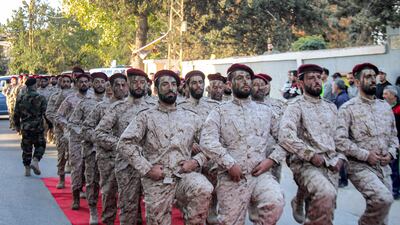In 1983, the US Embassy in Beirut was bombed, killing 63 people. The group behind the attack was linked to the Iranian-backed Lebanese militia and political party Hezbollah, which has been behind many similar attacks since.
It remains largely unpunished and, to the detriment of Lebanon and beyond, has become one of the most potent political outfits in the Middle East.
Its criminality and clout are a problem for foreign governments, who have to decide whether or not to recognise it as, at least in party, a legitimate political actor, or simply as a terror organisation. Israel and the US, for example, have chosen the latter.
As of this week, Australia has, too. It is a fair assessment. Like many countries, Australia had previously chosen to distinguish between what it viewed as Hezbollah’s "political" and "military" wings, recognising the former while sanctioning the latter.
That distinction has been difficult to justify for some time. Hezbollah has refused to give up arms since the end of Lebanon's civil war in 1990. Violent, sectarian ideology is the basis of its agenda, and it is a regular stumbling block on the road to vital reforms in Lebanon.
Australia says its decision has been made based on Hezbollah "continuing to threaten terrorist attacks and provide support to terrorist organisations" and that it poses a "real" and "credible" threat to Australians. Canberra’s concerns resemble those that drove the UK government last week to institute a full-scale ban on Palestinian militant group Hamas. Britain’s decision also does away with any distinction between a militant party’s political and military wings.
It is a country's sovereign right to decide how it approaches complex relationships abroad. Recognising the need for dialogue with violent groups is often necessary. In the UK's case, the intractable violence of the Irish Republican Army largely came to an end when former prime minister Tony Blair negotiated a way for some of the group's members to enter politics.
But in Lebanon and Palestine, years have gone by with very few signs that Hezbollah and Hamas are willing to engage seriously in such a process. Political openings have largely been used to expand militant activity.
Designations also have domestic implications. Both Australia and the UK have said that both groups pose an increasingly serious security threat. Australia has important ties with Lebanon, largely because it has a significant number of citizens who are either dual Lebanese citizens or have family there, and so views the dire state of Lebanese politics and Hezbollah's role in it as an issue close to home. The UK was used in the past by Hamas to fundraise, and groups aligned with it have been accused of stoking anti-semitism. The organisation's status has even caused controversy at the highest levels of British politics; former Labour Party leader Jeremy Corbyn's opponents used his alleged past sympathy with the group to discredit him. Now that Hamas is labelled a fully fledged terrorist outfit, prior associations will be even more awkward.
History shows that even the most entrenched terrorist threats can be tackled with negotiations, often in return for political representation. However, that must be based on a willingness to engage in peaceful and diplomatic efforts. No one should have any expectation that Hezbollah and Hamas will begin such a process anytime soon, but we can hope that calling them what they are might remind both that their actions are not going unnoticed.







